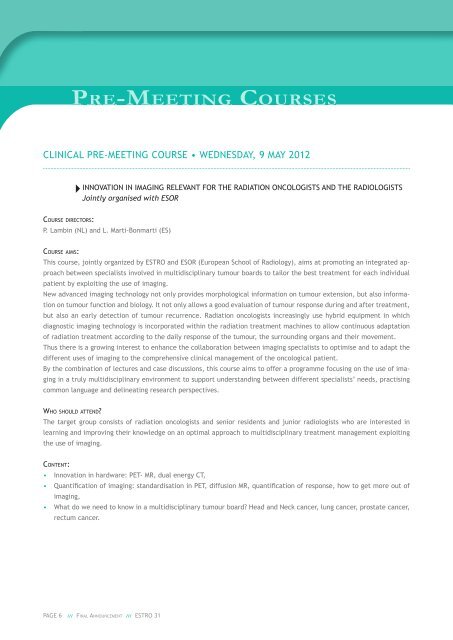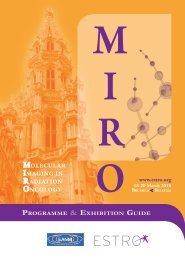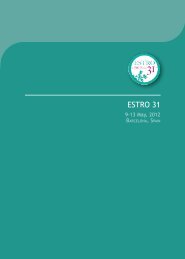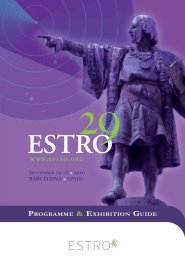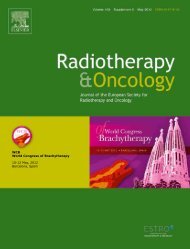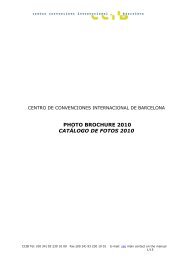9-13 May 2012 • Barcelona, Spain - Estro-events.org
9-13 May 2012 • Barcelona, Spain - Estro-events.org
9-13 May 2012 • Barcelona, Spain - Estro-events.org
Create successful ePaper yourself
Turn your PDF publications into a flip-book with our unique Google optimized e-Paper software.
Pre re-M -Meeting eeting CCourses<br />
ourses<br />
CLInICaL PRe-MeeTIng COuRSe <strong>•</strong> WeDneSDaY, 9 MaY <strong>2012</strong><br />
InnOVaTIOn In IMagIng ReLeVanT FOR THe RaDIaTIOn OnCOLOgISTS anD THe RaDIOLOgISTS<br />
Jointly <strong>org</strong>anised with ESOR<br />
course dIrectors:<br />
P. Lambin (nL) and L. Marti-bonmarti (eS)<br />
course aIms:<br />
This course, jointly <strong>org</strong>anized by eSTRO and eSOR (european School of Radiology), aims at promoting an integrated approach<br />
between specialists involved in multidisciplinary tumour boards to tailor the best treatment for each individual<br />
patient by exploiting the use of imaging.<br />
new advanced imaging technology not only provides morphological information on tumour extension, but also information<br />
on tumour function and biology. It not only allows a good evaluation of tumour response during and after treatment,<br />
but also an early detection of tumour recurrence. Radiation oncologists increasingly use hybrid equipment in which<br />
diagnostic imaging technology is incorporated within the radiation treatment machines to allow continuous adaptation<br />
of radiation treatment according to the daily response of the tumour, the surrounding <strong>org</strong>ans and their movement.<br />
Thus there is a growing interest to enhance the collaboration between imaging specialists to optimise and to adapt the<br />
different uses of imaging to the comprehensive clinical management of the oncological patient.<br />
by the combination of lectures and case discussions, this course aims to offer a programme focusing on the use of imaging<br />
in a truly multidisciplinary environment to support understanding between different specialists’ needs, practising<br />
common language and delineating research perspectives.<br />
Who should attend?<br />
The target group consists of radiation oncologists and senior residents and junior radiologists who are interested in<br />
learning and improving their knowledge on an optimal approach to multidisciplinary treatment management exploiting<br />
the use of imaging.<br />
content:<br />
<strong>•</strong> Innovation in hardware: PeT- MR, dual energy CT,<br />
<strong>•</strong> Quantification of imaging: standardisation in PeT, diffusion MR, quantification of response, how to get more out of<br />
imaging,<br />
<strong>•</strong> What do we need to know in a multidisciplinary tumour board? Head and neck cancer, lung cancer, prostate cancer,<br />
rectum cancer.<br />
RaDIObIOLOgY PRe-MeeTIng COuRSe <strong>•</strong> WeDneSDaY, 9 MaY <strong>2012</strong><br />
ESTRO<br />
31<br />
<strong>2012</strong><br />
COMbInIng RaDIaTIOn WITH TaRgeTeD THeRaPIeS: COnCePTS, OPPORTunITIeS anD PITFaLLS<br />
course dIrectors:<br />
C. Vens (nL) and a. Chalmers (gb)<br />
course aIms:<br />
Research into the mechanisms underlying resistance of tumours to radiation therapy has identified a number of key pathways<br />
that could be targeted in order to improve tumour control. and advances in drug development have provided us<br />
with new drugs to manipulate these pathways. but only a few of these targeted agents have been successfully combined<br />
with radiation therapy in the clinic, and the results have been mixed. The aim of this course is to provide an overview of<br />
the key concepts and pathways involved, and to discuss progress made and problems encountered in bringing radiation/<br />
targeted therapy combinations to the clinic.<br />
Who should attend the course?<br />
The course is targeted at radiation oncologists who may be aware of the existence of targeted therapies, and may even<br />
have prescribed them, but would like to learn more. In particular we will try to explain why and how these agents can<br />
be combined with radiation therapy. Research or scientific experience is not required, but the course will also be of<br />
interest to scientists undertaking radiation related research.<br />
content:<br />
The course will provide an overview of targeted therapy concepts in four areas that are relevant to radiation responses<br />
of tumours:<br />
<strong>•</strong> Dna damage responses (including Dna repair and cell cycle checkpoints),<br />
<strong>•</strong> Signal transduction pathways (including egFR, PI3K and related pathways),<br />
<strong>•</strong> Tumour microenvironment (including hypoxia, integrins and cancer stem cells),<br />
<strong>•</strong> angiogenesis.<br />
There will then be a session on how to determine which patients are likely to benefit from which combinations. This<br />
will include aspects of biomarker development including imaging, pathology, clinical features and molecular subtyping.<br />
The final session will focus on clinical application of these concepts. Here we will consider what we have learned from<br />
those clinical trials that have been conducted – both positive and negative – and how we can select the best drugs and<br />
design the best clinical studies. The course will finish with a vision of the future in which combinations of radiation and<br />
targeted therapies are considered to be ‘standard of care’.<br />
a panel of invited international speakers will provide high quality talks that are specifically tailored to our target audience.<br />
In between talks there will be lots of opportunities (and much encouragement) for spirited discussion involving<br />
faculty and delegates.<br />
Page 6 /// FInal announcement /// eSTRO 31 eSTRO 31 /// FInal announcement /// Page 7


